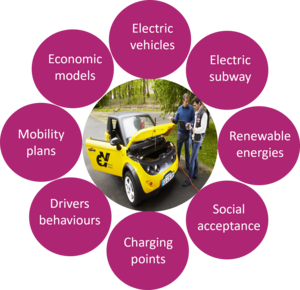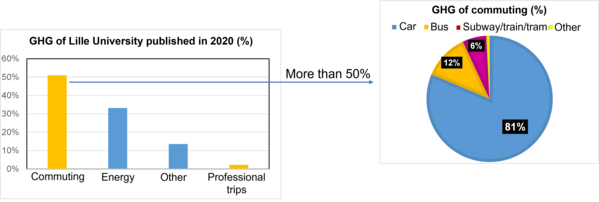
CUMIN Program
The CUMIN (Campus of University with Mobility based on Innovation and carbon Neutrality) program aims to develop a demonstrator campus, based on electro-mobility, in order to reduce greenhouse gas (GHG) emissions at the campus Cité Scientifique of the University of Lille.
The ultimate goal of CUMIN is to use the eco-campus as a living lab to develop flexible methods and tools to enable valuable transition to e-mobility: replacement of pollutant thermal cars by alternative mobility solutions including various types of e-vehicles (from e-bike to e-trains).
CUMIN is an interdisciplinary program which gathered at first research teams on electrical engineering from L2EP and on urban planning from TVES. Since 2024, others research teams have joined the project: on mechanical engineering from LaMcube, on socio-economics from CLERSE, on atmospheric optics from LOA and on scientific communication GERiiCO to work on different projects related to electro-mobility.
Overview of CUMIN
Greenhouse gases emissions of the campus Cité Scientifique
International collaborations of CUMIN
The University of Québec à Trois-Rivières (Canada) has adopted the model of CUMIN for its own campus. A collaboration between both universities has been established in 2018, to create the International Associate Laboratory (IAL): eCAMPUS (electro-mobility for CAMPus of Universities based on Sustainability).
The objective of eCAMPUS is to develop methodologies for the research and implementation of electro-mobility in university campuses, towards a future development of eco-cities. If the campus "cité sceintifique" will be the core of the developments, the results will be extended to alll the campuses of the University of Lille and also to campuses of our international partners.
Another collaboration exists between CUMIN and Rochester Institute of Technology (RIT). They conduct togheter technical-economical research on sustainable campuses (TESS) and on batteries' second life (TESSA).


Contact: Prof. Alain BOUSCAYROL, coordinator of the program.










